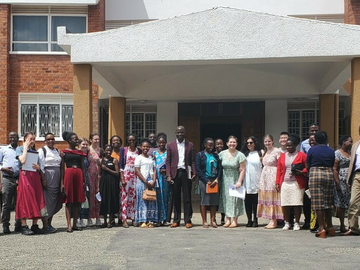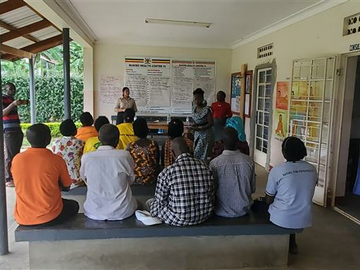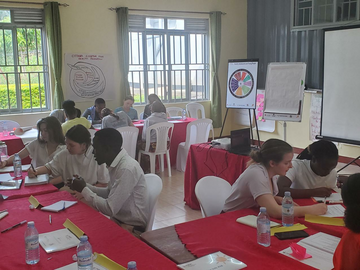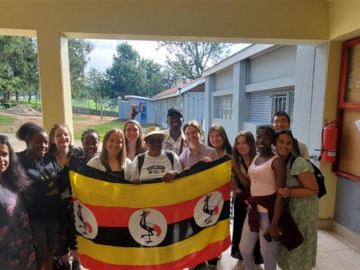Sept. 1, 0023
UCalgary and Ugandan students share valuable experience in community engagement and health promotion

For many UCalgary students who attend the Global Health Sciences Field School in southwest Uganda, it’s their first experience as global citizens and community health advocates. In a passionate speech presented in Uganda by Bachelor of Health Sciences (BHSc) student Katie Cooke, Cooke spoke to local and visiting leaders about that deep impact.
“This has been an incredible experience for us to have, and I think that I can say on behalf of the group that we have grown in many ways — some expected, and some unexpected.
“The opportunity,” she adds, “has imparted to us invaluable skills on how to work cross-culturally, facilitate and moderate group discussions and challenge the notion that solutions for complex challenges need to come from ‘experts,’ rather than from the people actively facing these challenges.”
The Uganda Global Health Sciences Field School is an educational initiative between UCalgary and the Mbarara University of Science and Technology (MUST) that began in 2019. In addition to this specific program, the Cumming School of Medicine (CSM) has worked jointly with MUST for over 20 years on many initiatives in a variety of medical sub-speciality areas and in communities, including programs through the Healthy Child Uganda (HCU) partnership, established in 2002 to promote maternal and child health.
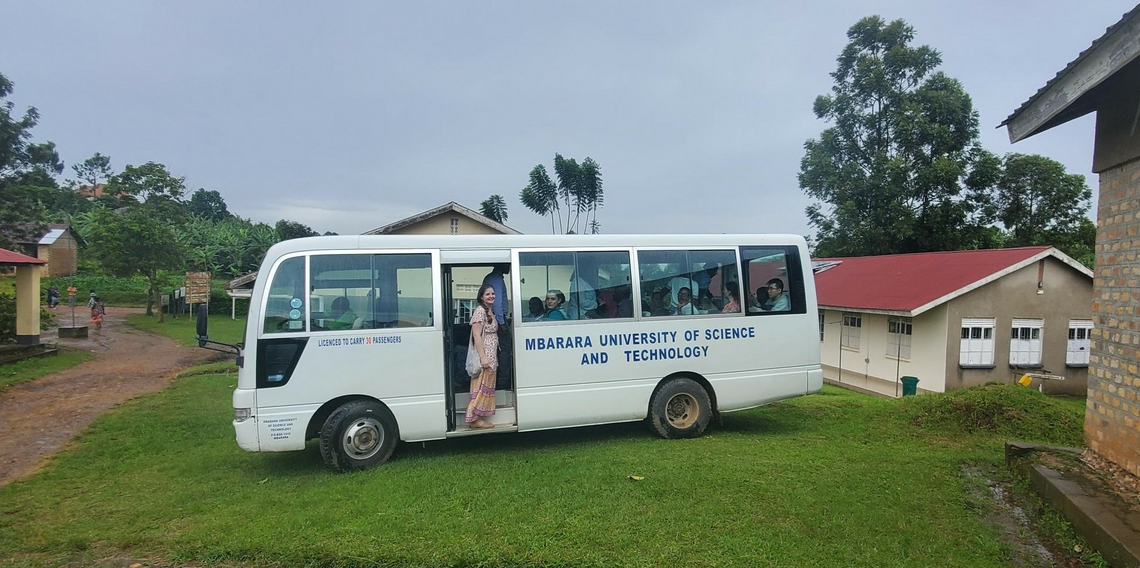
Student Sophie Pett boards the bus as UCalgary and Mbarara University of Science and Technology students prepare to visit communities in southwest Uganda and explore ways to develop health promotion projects for youth.
Throughout the four-week field school, nine UCalgary students learned together with 10 MUST students who additionally served as cultural ambassadors. Students from both institutions worked alongside the HCU field team, gaining hands-on exposure to community development, health equity, health promotion principles and practices and social determinants of health in rural Uganda.
Overall, the field school provided an opportunity for experiential learning about global health through this mix of participatory workshops and community field work. Daily activities emphasized group work enabling learning about the Ugandan health system and context, cultural sensitivity and community engagement principles. Students were divided into groups and worked with communities including local leaders, health workers and youth themselves, to co-design and implement adolescent health promotion strategies.
CSM Dean Dr. Todd Anderson, who visited Uganda while the school was in session, was inspired by the students’ commitment and proud to see their work in action.
“Global health opportunities offer an enriching experience for our students and they help inform our own approach to community-engaged learning in Calgary,” Anderson says. “Through our two-way training approach we are able to learn from one other, and it benefits all of us. The CSM values this long-standing relationship with our university partner to promote global health and equity.”
Anderson says hospital and university colleagues in Uganda have been wonderful partners of the CSM over the last two decades.
“The CSM is blessed to have dedicated global health leaders here as well,” he adds. “Drs. Jenn Brenner, Diane Mosher, Jaelene Mannerfeldt, and others are among more than 50 faculty members who have dedicated time in Uganda and developed successful partnerships.”

UCalgary and MUST students brainstorm ideas for a private health care space for youth.
Community engagement as cornerstone
The Ugandan field school has applied a community-engaged learning philosophy since it was piloted four years ago. Following this model, students work together with MUST staff and medical student teams to engage with local community members in planning and implementing health-related projects.
BHSc student Brennah Kamelchuk says students applied community engagement approaches, entering each community with humility and an understanding of Ugandan culture.
“Community-based learning is about listening and absorbing new ideas from the community members themselves,” she says. “It's about interacting with one another, forming relationships and learning new ideas through the community's perspective.”
As programming this season was focused on adolescents and youth, the students concentrated on empowering local youth to access health care and to advocate for themselves. They consulted with parents and youth around many issues related to sexual health, parenting and youth experience within the health-care system, and worked toward developing three projects.
One student group together with their host community created a parenting manual which was presented to and adopted by the Ugandan Ministry of Health as a resource in development. At another health facility, a safe space for youth to seek health care in a private setting was established and health messaging was painted on the walls.
MUST student Babirye Sharifah says listening to local youth and community needs is an essential aspect of community engagement as it builds trust and a sense of ownership.
“I felt we were heard because opportunities were created for us, giving us room to give feedback and have a say on how the curriculum or programming is developed."
MUST student Dennis Arikiriza, who has great memories of working with students from UCalgary, says he gained a new respect for cultural diversity and new skills in time management and communications.
“I was able to learn about and respect the Canadian culture and also was free to share how the culture is here in some of the Ugandan communities, just like how the University of Calgary students were sharing with us the culture in their communities in Canada.”
All the students showed great resiliency and commitment, says UCalgary Global Health Co-ordinator Kathleen Jack. Their experience was a unique opportunity to enhance their cross-cultural competency and develop communication and project management skills.
“They were listening to community needs and generating relevant ideas and appropriate solutions with the community,” she says. “It was a real co-learning and cross-cultural experience. I think it was a right-place, right-time moment that we hope to continue for years to come.”
Celebrating 20 years of partnership
This year MUST and UCalgary celebrate 20 years of institutional partnership which has seen collaboration in community programming (including through Healthy Child Uganda), research, and joint learning initiatives. Since 2003, a small seed planted by Drs. Brenner (Calgary) and Jerome Kabakyenga (Uganda), has expanded and branched out resulting in diverse grants, studies, publications, policy papers and advocacy. The Cumming School of Medicine is dedicated to working collaboratively with core university partners from around the globe on initiatives to advance global health promotion and equity.

